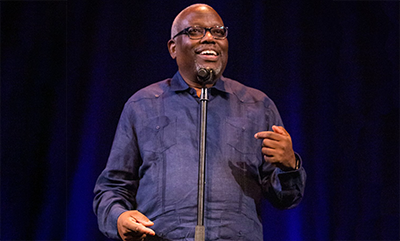Storytelling Matters.

Viewpoint articles are written by members of the SPH community from a wide diversity of perspectives. The views expressed are solely those of the author and are not intended to represent the views of Boston University or the School of Public Health. We aspire to a culture where all can express views in a context of civility and respect. Our guidance on the values that guide our commitment can be found at Revisiting the Principles of Free and Inclusive Academic Speech.
We take storytelling seriously here at the School of Public Health because we believe that stories make our valuable work accessible and digestible to the broader public.
Recently, the school hosted a seminar with Dr. Rafael Campo, the author of our 2019 SPH Reads selection The Desire to Heal: A Doctor’s Education in Empathy, Identity, and Poetry. This fall, the Activist Lab is partnering with the Office of the Provost to host performance artist Rhodessa Jones, our Artist in Residence. And later this semester, the Student Senate will hold its annual BUSPH Stories event where students will have an opportunity to share personal narratives and put “a human face to public health.”
To help understand why we feel storytelling is so important, here’s a pop quiz:
An oncologist—let’s call her “Dr. Science”—wants to educate her male patients on the importance of prostate cancer screenings, and encourage them to receive this screening. In which instance below are Dr. Science’s patients more likely to heed her suggestion?
- Dr. Science states facts and figures about the prevalence and incidence of prostate cancer and urges her patients to be screened.
- Dr. Science shares the story of Marvin, a 52-year-old African American husband and father of two, who was diagnosed with early-stage prostate cancer after he received a screening at a local community health center. Because Marvin was able to obtain treatment early on in his illness, he is now cancer-free. Dr. Science conveys her relief and joy for Marvin and urges her male patients to follow Marvin’s proactive approach.
If you chose option B, you pass the storytelling test. Aren’t you rooting for Marvin? Aren’t you more likely to encourage male patients to get screened because Dr. Science shared her story?
This is the power of storytelling—the art of sharing stories to engage an audience and convey a message or information that the listener can absorb and connect with in an emotional way. We hear stories everywhere we go—in likely places, such as schools and libraries, but also in unexpected places, such as rock concerts, gyms, public health conferences, and right here at the School of Public Health.
It’s important to understand what stories can do for us:
- They help us to understand complex information
- They help us to relate to the storyteller and the topic being shared
- They can entertain us
- They can move us to action
Conveying information that can help people is a cornerstone of public health. We aim to communicate our research effectively, evolve best practices for the field, and shape policies that lead to better health outcomes and enable people to live healthier lives. Stories become a powerful tool to create a lasting impact on the audience.
There is no perfect recipe for crafting a great story. There are too many variables in the storytelling process that are unique to each storyteller. Just like the perfect chocolate chip cookie, the process takes practice and experimenting to discover the recipe that works for you. But here are a few elements that I hope you consider incorporating into your next story:
- Authenticity: incorporate a piece of yourself
- Many times, compelling stories contain a conflict that may or may not be resolved. Make the dramatic content of your story strong
- Create believable, memorable characters
- Grab the listeners’ attention at the beginning
- Deliver a knock-out ending
- There is a difference, and a value, to reading a story and hearing a story. Getting the delivery right is part of the recipe
This list is far from exhaustive. What I hope you take away is that being a storyteller requires skills that public health professionals can and should develop. It takes practice. And the Activist Lab is here to help.
Join us for a Storytelling Workshop on Thursday, October 10 in the INS 411 classroom to start honing your storytelling recipe. Please register.
Harold Cox is associate dean for public health practice and associate professor of community health sciences at SPH.
Comments & Discussion
Boston University moderates comments to facilitate an informed, substantive, civil conversation. Abusive, profane, self-promotional, misleading, incoherent or off-topic comments will be rejected. Moderators are staffed during regular business hours (EST) and can only accept comments written in English. Statistics or facts must include a citation or a link to the citation.